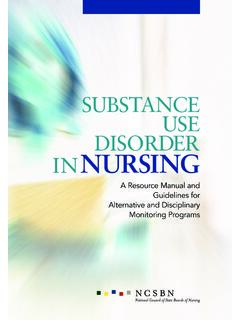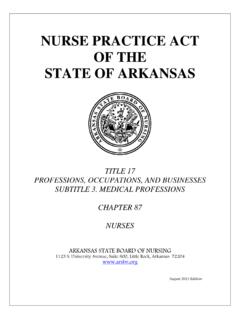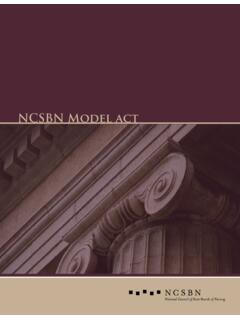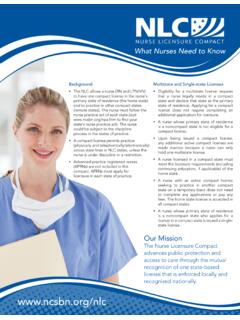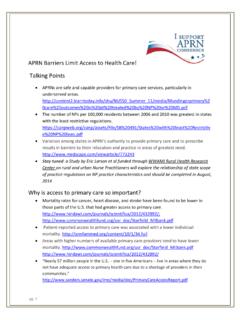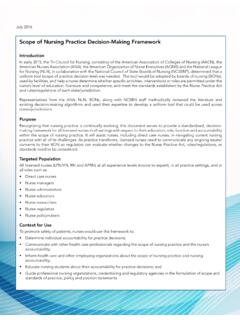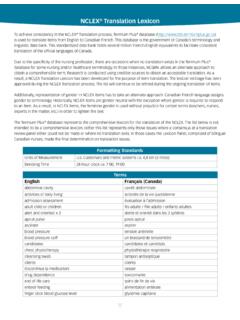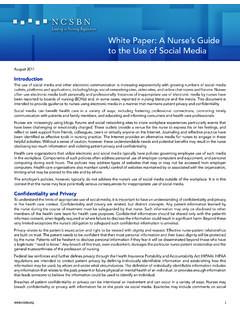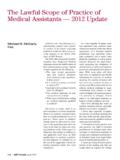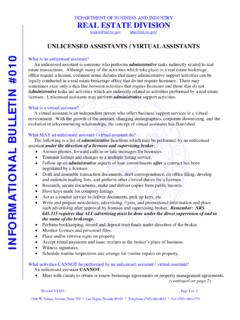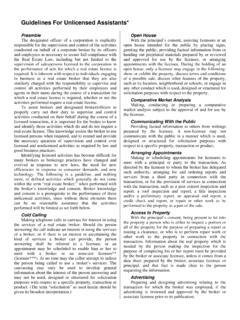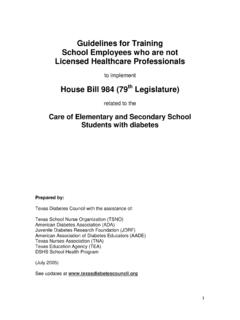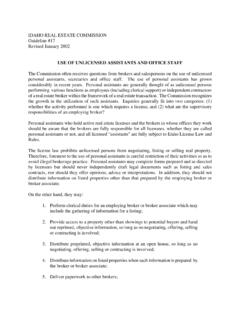Transcription of National Guidelines for Nursing Delegation - NCSBN
1 5 Volume 7/Issue 1 April 2016 National Guidelines for Nursing DelegationNational Council of State Boards of NursingIn early 2015, the National Council of State Boards of Nursing convened two panels of experts representing education, research, and practice. The goal was to develop National Guidelines based on current research and literature to facilitate and standardize the Nursing Delegation process. These Guidelines provide direction for employers, nurse leaders, staff nurses, and : Delegation , evidence-based, Guidelines , Nursing assignment, regulation, researchObjectives Understand evidence-based, state-of-the-art standards for Delegation . Explain the differences between assignment and Delegation and the responsibilities of the employer, nurse leader, delegat-ing nurse, and delegatee in the process of care is continuously changing and this includes the roles and responsibilities of licensed health care providers and assistive personnel.
2 The num-ber of licensed nurses ( , advanced practice registered nurses [APRNs], registered nurses [RNs], or licensed practical nurse/vocational nurses [LPN/VNs]) may be limited in certain regions and/or institutions. Therefore, care may need to extend beyond the traditional role and assignments of RNs, LPN/VNs, and unlicensed assistive personnel (UAP). When certain aspects of Nursing care need to be delegated beyond the traditional role and assignments of a care provider, it is imperative that the del-egation process and the state nurse practice act (NPA) be clearly understood so that it is safely and effectively carried Delegation process is multifaceted. It begins with decisions made at the administrative level of the organization and extends to the staff responsible for delegating, overseeing the process, and performing the responsibilities.
3 It involves effective communication, empowering staff to make deci-sions based on their judgment and support from all levels of the health care setting. The employer/nurse leader, individual licensed nurse, and delegatee all have specific responsibili-ties within the Delegation process. (See Figure 1.) It is crucial to understand that states/jurisdictions have different laws and rules/regulations about Delegation , and it is the responsibility of all licensed nurses to know what is permitted in their state NPA, rules/regulations, and early 2015, the National Council of State Boards of Nursing ( NCSBN ) convened two panels of experts representing education, research, and practice to discuss the literature and key issues, and evaluate findings from Delegation research funded through NCSBN s Center for Regulatory Excellence Grant Program.
4 The goal was the development of National Guidelines to facilitate and standardize the Nursing Delegation process. They build on previous work by NCSBN and the American Nurses Association, and provide clarification on the responsi-bilities associated with , these Guidelines are meant to address del-egation with respect to the various levels of Nursing licensure ( , APRN, RN, and LPN/VN, where the state NPA allows). Delegation Versus AssignmentDelegation has been a source of significant debate for many years and includes many philosophical discussions over the differences between assignment and Delegation . Much of the literature sur-rounding Nursing Delegation has focused on the Nursing home setting. The Centers for Medicare & Medicaid Services (CMS) requires Nursing homes to employ certified Nursing assistants or aides (CNAs) as part of a mechanism to ensure higher standards of care.
5 Through this mechanism, CMS supports federal regu-lations concerning CNA training and competency, which were established by the Omnibus Budget Reconciliation Act of 1987. These regulations require Nursing homes to employ CNAs who complete state-approved CNA programs, outline the funda-mental skills that should be included in all CNA programs, and require the CNA to pass a competency evaluation administered and evaluated only by the state or by a state-approved entity and be added to the state registry. The interpretation of these Guidelines by the Nursing practice community has likely led to some confusion about what activities, skills, or procedures can be delegated to CNAs. The regulations define the minimum curriculum to be included in a CNA program but do not nec-essarily define all the activities, skills, or procedures that can Continuing Education6 Journal of Nursing Regulationbe performed by a CNA.
6 It is likely that Nursing practice has understood these regulations to mean that CNAs can only per-form those activities, skills, or procedures that were learned in the basic state-approved CNA training program. CMS defers to state requirements for what CNAs are allowed to perform (Sheila Blackstock, personal communication, December 7, 2015).When performing a fundamental skill on the job, the delegatee is considered to be carrying out an assignment. Delegation is allowing a delegatee to perform a specific Nursing activity, skill, or procedure that is beyond the delegatee s tradi-tional role and not routinely performed. This applies to licensed nurses as well as of the current role of the delegatee (RN, LPN/VN, or UAP), Delegation can be summarized as follows: A delegatee is allowed to perform a specific Nursing activ-ity, skill, or procedure that is outside the traditional role and basic responsibilities of the delegatee s current job.
7 The delegatee has obtained the additional education and training, and validated competence to perform the care/del-egated responsibility. The context and processes associated with competency validation will be different for each activity, skill, or procedure being delegated. Competency validation should be specific to the knowledge and skill needed to safely perform the delegated responsibility as well as to the level of practitioner ( , RN, LPN/VN, UAP) to whom the activity, skill, or procedure has been delegated. The licensed nurse who delegates the responsibility main-tains overall accountability for the patient. However, the del-egatee bears the responsibility for the delegated activity, skill, or procedure. The licensed nurse cannot delegate Nursing judgment or any activity that will involve Nursing judgment or critical deci-sion making.
8 Nursing responsibilities are delegated by someone who has the authority to delegate. The delegated responsibility is within the delegator s scope of practice. When delegating to a licensed nurse, the delegated responsi-bility must be within the parameters of the delegatee s autho-rized scope of practice under the of how the state/jurisdiction defines Delegation as compared to assignment, appropriate Delegation allows for the transition of a responsibility in a safe and consistent manner. The licensed nurse transfers the performance of an activity, skill, or procedure to a delegatee. However, the practice pervasive func-tions of clinical reasoning, Nursing judgment, or critical decision making cannot be should not be confused with assignment. Assignment is defined as follows.
9 The routine care, activities, and procedures that are within the authorized scope of practice of the RN or LPN/VN or part of the routine functions of the UAPFIGURE 1 Delegation ModelEmployer/Nurse Leader Responsibilities Identify a nurse leader Determine Nursing responsibilities that can be delegated, to whom, and in what circumstances Develop Delegation policies and procedures Periodically evaluate Delegation process Promote positive culture/work environmentLicensed Nurse Responsibilities Determine patient needs and when to delegate Ensure availability to delegatee Evaluate outcomes of and maintain accountability for delegated responsibilityDelegatee Responsibilities Accept activities based on own competence level Maintain competence for delegated responsibility Maintain accountability for delegated activityTwo-way CommunicationTraining and EducationPublic ProtectionCommunicate information about Delegation process and delegatee compe-tence level 7 Volume 7/Issue 1 April 2016 The above are included in the coursework taught in the del-egatee s basic educational
10 Licensed nurse is still responsible for ensuring an assign-ment given to a delegatee is carried out completely and example of assignment is an LPN/VN caring for a dia-betic patient. He or she takes vital signs, checks the blood sugar level using a blood glucose meter, monitors input and output, documents the information, and reports data to the RN. This is considered an assignment because these functions are taught in the LPN/VN program and are part of the LPN/VN scope of exception to these definitions pertains to advanced UAP roles. Skills once believed exclusive to the RN and LPN/VN role are now taught in certain advanced UAP programs. In a basic course, examples of this include: Certified medication aides taught to pass out medications Certified medical assistants taught to give injections.
